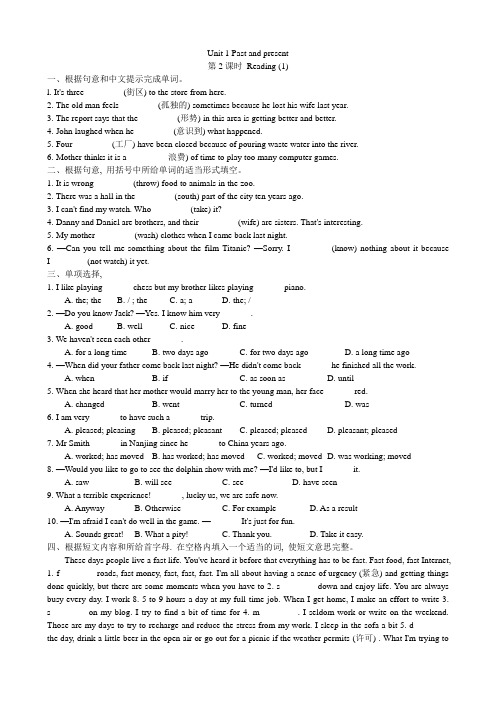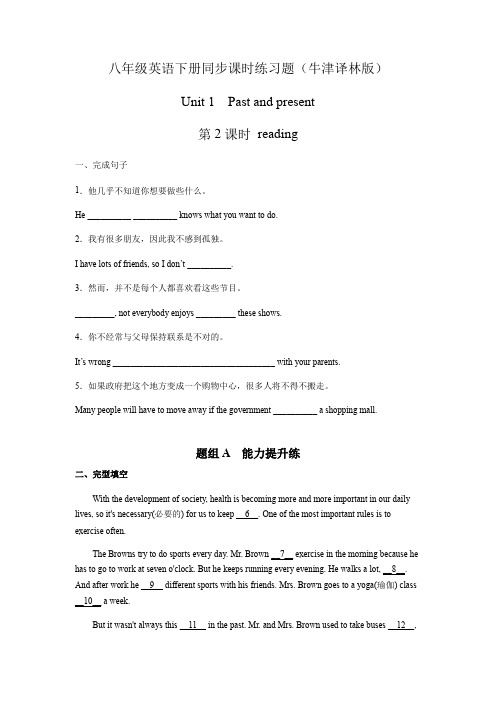Unit 1 第2课时-阅读
2024年新版人教版七年级上册英语Unit 1(第2课时 )(教学设计)

总结本课所学内容,巩固加深印象。
利用将思维导图给学生进行有序的梳理。
Part6:
考点速递
(5min)
T explainsknowledge points.
将知识点做好笔记进行理解消化。
将教学落到实处,交际意识培养之后,知识点的教授也跟上,保证学生在理解的同时能够运用到具体题型中去。
4.T guides Ss to finish the task in 2b.
5.T guides Ss to finish the task in 2c.
6.T asks Ss to listen again and pay
attention to the pronunciation of
Who’s, I’m, he’s, and it’s. Then role-play the conversation.
3.了解中英文姓名的差异和中外文化差异,提高跨文化意识。(学习理解)
使用正确的语音、语调和肢体语言,分角色对话,学会正确运用本堂课所学重点知识,提高口语交际能力。(应用实践)
教学
重难点
学习重点:在介绍类互相认识的对话中,使用正确的语音、语调和肢体语言,分角色对话。
学习难点:使用得体的语言进行多轮次对话。
基于课程标准的“教-学-评”一致性课堂教学设计
科目
英语
授课教材
人教版七年级上册
授课题目
Unit1 You and Me
Section A (Pronunciation-2e)
课时
课型
第2课时
语音课+听说课
主题情境
学校生活
授课教师
语篇研读
【What】
9A Unit 1 第2-3课时教案

9A Unit 1 Star Signs第二、三课时Reading鲁河中学陈寿红Objectives1. To understand what star signs are and what they represent2. To recognize and understand vocabulary about characteristics3. To use adjectives to describe someone’s characteristicsTeaching procedures:1. Brainstorm the vocabulary that is used to describe people’s characteristics. Encourage students to explain each word to their classmates.2. Read the passage aloud to students. Ask them to listen carefully to you and follow the text on page 4 and 5.3. Ask one student at a time to read a paragraph. After each paragraph, ask students to say which parts of the text they do not understand. Less able students may find some of the names of the star signs difficult. If so, do not force them to learn them by heart because they are only used here to arouse students’ interest. It is more important for them to learn the adjectives that describe people’s characteristics. This will enable them to complete the Main Task at the end of the unit.4. Ask some questions to check understanding.Part BTeaching procedures1. Before doing Part B, review adjectives used to describe characteristics. Ask students to describe their classmates.2. Ask less able students to work in pairs. Tell them to skip the ones they are not sure about and do the easier ones first. Check answers as a class.Part CTeaching procedures1. Tell students to work in pairs to complete Part C1. When students have completed all the answers, ask them to raise their hands. The first pair to complete the exercise correctly is the winner.2. After students have finished, give the correct answer to each question. Highlight where students can find the answers in the passage. This will help them when correcting their own mistakes and provide them with a better understanding of wherethey went wrong.3. For stronger classes, ask students to correct the incorrect sentences.4. Review key vocabulary learnt in the reading passage. Ask more able students to describe their partners using these adjectives.5. Ask students to do Part C2 on their own and check their answers with their partners. Ask students to refer to the reading passage on page 4 and 5. If students have different answers, ask them to discuss the answers.Part DTeaching procedures1. For weaker classes, write a list of characteristics on the board for students’reference2. Ask less able students to pick five characteristics that describe themselves and write them in the blanks in part D1. Tell more able students that they can also use characteristics that are not listed on the board. Tell less able students to refer to the reading passage on pages 4 and 5 if they need help with ideas.3. Now, ask students to read the description of their star sign on pages 4 and 5. Ask them to write whether the characteristics listed under their star sign match the characteristics they have listed.4. Ask all those who think their characteristics match their star sign to raise their hands. Then ask all those whose characteristics do not match to raise their hands.5. Do a class survey. Ask students whether they believe in star signs. Count how many say ‘yes’and how many say ‘no’. Write the numbers on the board. For more able students, ask them to say why they believe or do not believe in star signs.6. Divide the class into pairs. Ask students to write down five words that describe their partner’s characteristics in Part D2.7. Ask students to exchange books and compare what they have written.8. Homework: 《课时练》P3-6 课后笔记:。
英语九下-Unit1课后作业(阅读)

( C )4. Which of the following is NOT true according to the passage? A. By 2020 we will have 260 airports in our country. B. 50% of coaches will be added to the ETC system by 2020. C. The high-speed rail network will cover 60% of big cities in our country by 2020. D. Our county will build more than 50 new airport by 2020.
centre not be promoted?
A. Shenzhen. B. Lanzhou.
C. Xi’an.
D. Urumqi.
( B )3. What’s the total length of the present road network? A. 4, 580, 000 km. B. 4, 008, 000 km. C. 572, 000 km. D. 22, 000 km.
英语● 九年级 ●下册 课后作业
Module 1 Explorations and exchanges
Unit 1 Great explorations
第2课时 Reading 建议用时:15分钟 实际用时:_____分钟 评价:_____
一、 根据教材P3的课文内容及首字母提示,补全下面 短文, 每空一词
二、根据教材P3的课文内容,回答下列问题 1. Who was Zheng He? __Z_h_e_n_g__H_e__w_a_s_a__fa_m__o_u_s__C_h_i_n_e_se__e_x_p_lo_r_e_r_. ________ 2. Where was Zheng He born? ___(__H_e__w_a_s__b_o_r_n_i_n_)__Y__u_n_n_a_n_._________________ 3. When did Zheng He go on his trips? ___F__ro_m___1_4_0_5_t_o_1_4_3_3_.__________________________
牛津译林版英语八年级下册课时练习 Unit 1 Period 2 Reading (1)

Unit 1 Past and present第2课时Reading (1)一、根据句意和中文提示完成单词。
l. It's three ________ (街区) to the store from here.2. The old man feels ________ (孤独的) sometimes because he lost his wife last year.3. The report says that the ________ (形势) in this area is getting better and better.4. John laughed when he ________ (意识到) what happened.5. Four ________ (工厂) have been closed because of pouring waste water into the river.6. Mother thinks it is a ________ 浪费) of time to play too many computer games.二、根据句意, 用括号中所给单词的适当形式填空。
1. It is wrong ________ (throw) food to animals in the zoo.2. There was a hall in the ________ (south) part of the city ten years ago.3. I can't find my watch. Who ________ (take) it?4. Danny and Daniel are brothers, and their ________ (wife) are sisters. That's interesting.5. My mother ________ (wash) clothes when I came back last night.6. —Can you tell me something about the film Titanic? —Sorry. I ________ (know) nothing about it because I________ (not watch) it yet.三、单项选择,1. I like playing ______ chess but my brother likes playing ______ piano.A. the; theB. / ; theC. a; aD. the; /2. —Do you know Jack? —Yes. I know him very ______ .A. goodB. wellC. niceD. fine3. We haven't seen each other ______ .A. for a long timeB. two days agoC. for two days agoD. a long time ago4. —When did your father come back last night? —He didn't come back ______ he finished all the work.A. whenB. ifC. as soon asD. until5. When she heard that her mother would marry her to the young man, her face ______ red.A. changedB. wentC. turnedD. was6. I am very ______ to have such a ______ trip.A. pleased; pleasingB. pleased; pleasantC. pleased; pleasedD. pleasant; pleased7. Mr Smith ______ in Nanjing since he ______ to China years ago.A. worked; has movedB. has worked; has movedC. worked; movedD. was working; moved8. —Would you like to go to see the dolphin show with me? —I'd like to, but I ______ it.A. sawB. will seeC. seeD. have seen9. What a terrible experience! ______ , lucky us, we are safe now.A. AnywayB. OtherwiseC. For exampleD. As a result10. —I'm afraid I can't do well in the game. — ______ It's just for fun.A. Sounds great!B. What a pity!C. Thank you.D. Take it easy.四、根据短文内容和所给首字母. 在空格内填入一个适当的词, 使短文意思完整。
牛津深圳版Module1MylifeUnit2Dailylife阅读课件

bike to
4.我从不迟到,我在学校过得很愉快。
I am never late for school. I have a 5.每周三下午从4:30到5:30我通常去参加篮球比赛。
good
7.practise doing sth.
练习做某事
8.be close to = near = beside = not far away from
接近;靠近
9.be late for school
上学迟到
10.have a break
休息
11.end at
在……结束
12.from…to… 从……到……
( A )6.—
—
A.far away from; close to
B.close to; far away from
C.
( A )7.—
—
A.blog
B.radio
C.
( B )8.— —My father is _________.He always uses scientific knowledge to solve
9.We make great music together. 我们一起演奏动听的音乐。 (1)make 是初中英语中出现频率很高的一个动词,它的用法主要有; 1)make/have/let sb. do sth. 使某人做某事 2)make sb.+adj. 使某人…… 3)make friends 交朋友 make cakes 做蛋糕 make a noise 发出噪音 make yourself at home 像在家里一样自在 make sure 确保 (2)go to…together 一起去…… together with 与……一样(常用作插入语) have a good time = enjoy oneself= have(great)fun 玩得开心
Unit 1 Reading第2课时参考-完整版课件

Reading
(1) What has caused Li Ziqi’s success? On a personal note, several reasons account for Li’s success. Firstly, the Internet has brought great convenience, which helps spread Li’s good reputation across the globe. Besides, in those videos, she is good at showing the close connection between food and traditional Chinese culture.
Revision
mood greedily
relieve
Observing
Complete the sentences with the correct forms of phrasal verbs in the left box and think of more phrasal verbs with “up”.
Assignment
Finish Part B on Page 57 in the workbook.
Goodbye!
Reading
Answer the following two questions. (1) What has caused Li Ziqi’s success? (2) What is the significance of promoting
traditional Chinese cooking?
For example, we often connect chicken soup with a happy childhood and its flavour becomes tied up with the feeling of being taken care of. (Lines 19–21; to connect or link something to something else)
Unit 1 第2课时 -八年级英语下册同步课时练习题(牛津译林版,含答案)

八年级英语下册同步课时练习题(牛津译林版)Unit 1 Past and present第2课时reading一、完成句子1.他几乎不知道你想要做些什么。
He __________ __________ knows what you want to do.2.我有很多朋友,因此我不感到孤独。
I have lots of friends, so I don’t __________.3.然而,并不是每个人都喜欢看这些节目。
_________, not everybody enjoys _________ these shows.4.你不经常与父母保持联系是不对的。
It’s wrong _____________________________________ with your parents.5.如果政府把这个地方变成一个购物中心,很多人将不得不搬走。
Many people will have to move away if the government __________ a shopping mall.题组A 能力提升练二、完型填空With the development of society, health is becoming more and more important in our daily lives, so it's necessary(必要的) for us to keep __6__. One of the most important rules is to exercise often.The Browns try to do sports every day. Mr. Brown __7__ exercise in the morning because he has to go to work at seven o'clock. But he keeps running every evening. He walks a lot, __8__. And after work he __9__ different sports with his friends. Mrs. Brown goes to a yoga(瑜伽) class __10__ a week.But it wasn't always this __11__ in the past. Mr. and Mrs. Brown used to take buses __12__,even to the drugstore two blocks away. They wouldn't like to walk. But now the Browns __13__ their minds. They believe exercise can keep them healthy.We __14__ exercise every day, but we should try our best to exercise __15__ often as possible.6.A.healthy B.happy C.silent7.A.may not B.cannot C.should not8.A.also B.either C.too9.A.likes B.plays C.makes10.A.two B.second C.twice11.A.way B.kind C.matter 12.A.somewhere B.everywhere C.nowhere13.A.keep B.change C.clear14.A.don't B.mustn't C.needn't15.A.as B.so C.more三、阅读单选ALake Baikal in Southern Siberia is the largest, deepest freshwater lake in the world. Every winter when the lake freezes (冻结) over for half the year, 80-year-old Lyubov Morekhodova straps (用带子系好) on the same ancient skates she’s worn since the 1940s and glides (滑行) across the ice wherever she needs to go.Lyubov has been using the ice to travel around her faraway home for her whole life. As a child, she skated about 2.5 miles each way to school and back. She once fell through the ice and was luckily saved by her classmates.Now Lyubov lives alone in a small house on the shores of Lake Baikal. Her children and five grandchildren seldom visit her because they live five hours away by car. She has to look on a group of dogs, cows and chickens as her friends. Luckily, she has the ice to help her feel free! “For me, ice means being able to go anywhere and everywhere,” the grandmother said.Every day, she skates half an hour each way to the local village to do her shopping. Withtemperatures often reaching lows of-40 C, it’s hard for an old woman to live a normal life! But Lyubov says that her daily skates are the secret to her long life span (寿命). “People keep telling me I should slow down, but I just can’t!” She said with a laugh. “I don’t have time to be bored; there’s too much work to do.”根据材料内容选择最佳答案。
必修第一册 Unit 1teenage Life Reading and Thinking

②challenge 挑战;艰巨任务;
The role will be the biggest c__h_a_l_le_n_g_e___ (挑战)of Daisy’s acting career. 扮演这个 角色将是黛西演艺生涯中最大的挑战。
③title(书籍、诗歌、图画等的) 标题;题目; title(人名前表示地位、职业、婚否等的) 头衔;职称;
I had to choose extra-curricular activities, too. I tried to join the school football team, but the coach told me that I didn’t play well enough. Obviously, I was unhappy, but I won’t quit. I’ll find a way to improve on my own so that I can make the team next year. I joined a volunteer club instead. Every Wednesday, we work at a soup kitchen and hand out food to homeless people in the community.
- 1、下载文档前请自行甄别文档内容的完整性,平台不提供额外的编辑、内容补充、找答案等附加服务。
- 2、"仅部分预览"的文档,不可在线预览部分如存在完整性等问题,可反馈申请退款(可完整预览的文档不适用该条件!)。
- 3、如文档侵犯您的权益,请联系客服反馈,我们会尽快为您处理(人工客服工作时间:9:00-18:30)。
3.My mother and I will continue to visit Vivien.
我和妈妈将继续去看望维维恩。
continue to do sth. 继续做某事 【小试牛刀】
After he finished reading a novel,he continued to play games with his friends.
work during the school holidays. They wrote their reports. Betty went
to(2) a children’s hospital. The children there all suffered from serious(3) illnesses (ill).They(4)organized
我们需要帮助像蒂姆一样的孩子,使他们鼓起勇气。
need to do sth. 需要做某事
【小试牛刀】
We heed
to
do something to relax.
我们需要做些事情来放松放松。
一、课文语法填空。
Three teenagers offered to do some(1)voluntary(volunteer)
【小试牛刀】
(1)He offered his seat to the old on the bus.
他在公共汽车上给老人让座。
(2)Peteroffered Nhomakorabeato
teach them
water-skiing. 彼得表示愿意教他们滑水。
(3)He offered
to help (help)the disabled.
can bring them joy and peace. She wanted to help these children(10)
and raise their spirits.
二、阅读理解。 I work as a volunteer for an organization that helps the poor in
他主动帮助残疾人。
2.The children there all suffer from serious illnesses. 那里的孩子们都遭受着严重疾病的折磨。 suffer from 因……受苦;受折磨
【小试牛刀】
( A )People are suffering_______ the flood.
在他读完小说之后,他继续和他的朋友们玩游戏。
4.Disabled children have difficulty walking or moving. 残疾儿 童行动有困难。
have difficulty(in)doing sth. 做某事有困难
【小试牛刀】
(1)The students have difficulty in working out the maths problem .
After that, a five-year-old girl, wearing a too large dress and broken shoes, followed Brian around. Later he said regretfully(遗憾 地),“I wish I could speak French.” I was surprised that this was from a boy who always hated French classes.
(organization)a painting competition for the children. Mark spent
time(5) with
some children without parents. A girl(6)
called (call)Vivien lost her parents in a car accident. She is
Haiti. Recently I took my son Brian there for a week, hoping to educate
Before setting out, I told Brian this trip would be tiring and hard. For the first two days, he said almost nothing. Then on the third day, as we were climbing over high rocky mountains, he turned to me and smiled, “Pretty
Unit 1 Helping those in need
第2课时——阅读
栏目导航
课时精讲 课时过关 课后拓展
课文重点句子的讲解和学习。 1.Three teenagers offered to do some voluntary work during the school holidays.
三名青少年主动提出在学校假期期间去做义工。 offer to do sth.(主动)提出做某事
unhappy and(7) lonely (alone).She needs friendship. Mark
will continue(8) to visit (visit)her with his mother. Annie
taught som(e 9) disabled (able)children to sing because music
学生们做这道数学题有困难。
(2)Maybe you have difficulty in finding it.
也许你去找时会有困难。
5.I taught them to sing because music can bring them joy and
peace. 我教他们唱歌,因为音乐能带给他们喜悦与宁静。
teach sb. to do sth. 教某人做某事
【小试牛刀】
The teacher taught us how
to learn English
well. 老师教我们怎样学好英语。
6.We need to help children like Tim and raise their spirits.
